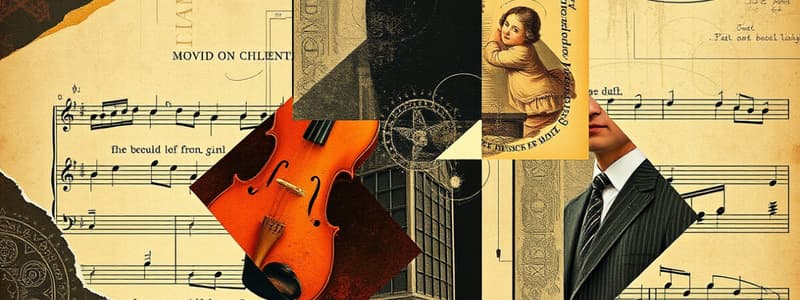Podcast
Questions and Answers
What is a coda?
What is a coda?
- The closing section of a musical composition (correct)
- A famous composer
- A musical piece for orchestra
- A type of string instrument
What does fortissimo mean?
What does fortissimo mean?
To be played very loudly
What is pianissimo?
What is pianissimo?
To be performed very softly
Who was Ludwig van Beethoven?
Who was Ludwig van Beethoven?
Who was Wolfgang Amadeus Mozart?
Who was Wolfgang Amadeus Mozart?
What is Joseph Haydn known as?
What is Joseph Haydn known as?
What is sonata allegro form?
What is sonata allegro form?
What is a classical concerto?
What is a classical concerto?
What is a cadenza?
What is a cadenza?
What defines absolute music?
What defines absolute music?
What are the key characteristics of the classical period?
What are the key characteristics of the classical period?
What does the term 'romanticism' refer to?
What does the term 'romanticism' refer to?
The classical period dates from 1750 to 1825.
The classical period dates from 1750 to 1825.
What forms the main structure in sonata-allegro form?
What forms the main structure in sonata-allegro form?
What did Beethoven change in sonata-form works?
What did Beethoven change in sonata-form works?
Flashcards are hidden until you start studying
Study Notes
Musical Terms and Concepts
- Coda: Closing section of a musical composition that completes a piece.
- Fortissimo: Instruction for music to be played very loudly; opposite of pianissimo.
- Pianissimo: Instruction for music to be performed very softly; opposite of fortissimo.
- Cadenza: Ornamental passage performed by a soloist, typically near the final cadence.
- Sonata: Musical composition for one or two instruments, usually with three or four movements in varied rhythms but related tonality.
Prominent Composers
- Ludwig van Beethoven (1770-1827): Key figure in romantic music; composed 9 symphonies, faced deafness but transformed musical expression. Died at age 57, renowned.
- Wolfgang Amadeus Mozart (1756-1791): Austrian child prodigy; composed operas, symphonies, and chamber music. Died broke at 35 but highly influential.
- Joseph Haydn (1732-1809): Prolific composer known as the "Father of the Symphony" and "Father of the String Quartet"; emphasized broad appeal in music and included humor in compositions.
Classical Music Forms
- Sonata Allegro Form: Common structure for the first movement of larger works, including introduction, exposition, development, and recapitulation, ending with a coda.
- Concerto: Three-movement work for solo instrument accompanied by an orchestra.
- Symphony: Extended orchestral work, usually in four movements.
- Chamber Ensembles: Small groups of musicians performing without a conductor, such as trios and quartets.
Styles and Characteristics
- Absolute Music: Music that exists independently of extra-musical narratives or images.
- Program Music: Instrumental music intended to evoke ideas, images, or narratives.
- Classicism: Style emphasizing clarity, balance, and formality modeled after ancient Greek and Roman principles.
- Romanticism: Artistic movement celebrating nature and emotional depth, contrasting with classical restraint.
Musical Structures
- Binary: Composition with two contrasting sections.
- Ternary: Musical form featuring three sections (ABA) with the first and last repeating while contrasting the middle.
- Minuet and Trio: A ternary form typically used as the third movement in classical compositions.
- Rondo: Form featuring a recurring theme interspersed with contrasting sections (e.g., ABACA).
Notable Works
- Beethoven's 5th Symphony: Known for its iconic 4-note motive, structured in sonata allegro form.
- Beethoven's 9th Symphony: Famous for incorporating soloists and chorus; based on Schiller's "Ode to Joy".
- Don Giovanni: Mozart's opera depicting the life of the infamous Don Juan, ends with his descent into hell.
Key Concepts
- Scherzo: Fast movement replacing the minuet in later classical works.
- Variations: Sections that repeat a theme with alterations in melody, harmony, or rhythm.
- Solo Concerto: Features a single instrument in dialogue with the orchestra.
- Characterization of Classical Period: Homophonic texture, clear harmonic structures, and the inclusion of elements like alberti bass.
Historical Context
- Classical Period (1750-1825): Marked the emergence of lighter textures and forms, moving towards romantic ideals.
- The Enlightenment: Intellectual movement highlighting reason and scientific thinking over tradition and religious beliefs.
- Influential Figure Styles: Haydn prioritized broad appeal and flexibility; Beethoven was known for innovation and heavier sounds; Mozart excelled in lyrical melodies and balanced structures.
These concepts and figures provide a foundation for understanding the classical music era and its prominent contributions to the art form.
Studying That Suits You
Use AI to generate personalized quizzes and flashcards to suit your learning preferences.




